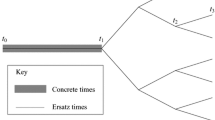Abstract
Carl Hoefer has argued that determinism in block universes does not privilege any particular time slice as the fundamental determiner of other time slices. He concludes from this that our actions are free, insofar as they are pieces of time slices we may legitimately regard as fundamental determiners. However, I argue that Hoefer does not adequately deal with certain remaining problems. For one, there remain pervasive asymmetries in causation and the macroscopic efficacy of our actions. I suggest that what Hoefer may have shown us is that causation, not determinism, was the threat to free will all along. Additionally, Hoefer might avoid the problem of the asymmetry of macroscopic efficacy by noting we have a very small region of space-time completely determined by our choices. However, this move implies our freedom to act is freedom to do very little, given that the region is trivial. I suggest that Hoefer should instead claim that we do have pervasive macroscopic efficacy toward the past, though I am unsure of how well this thesis works. Regardless, there remains a problem that the inside-out perspective requires us to see our choices as brute facts or random occurrences. Attempts to resolve this problem seem to require either a theory of agent causation or a traditional compatibilist argument, making Hoefer’s thesis extraneous, unless he can show us that these require the inside-out perspective. However, Hoefer has not yet shown us this, so there is work to be done.

Similar content being viewed by others
Notes
Hoefer, C. (2002). Freedom from the Inside Out. In C. Callender (Ed.), Time, Reality, & Experience (pp. 201–202) ed. Craig Callender (New York: Cambridge University Press).
The classic statement of this is, of course, Hobart, R. (1934). Free Will as Involving Determinism and Inconceivable without It. Mind 43, 1–27.
I have described the block universe this way so as to make it compatible with relativistic physics.
Strictly speaking, this is not correct. In the Minkovski space-time of special relativity, this would be true. However, we can describe general relativistic universes where this description of the block universe would be incorrect. This model works well enough for most places in our own universe, which are normally locally Minkovskian.
See also Saunders, S. (2002). How Relativity Contradicts Presentism. In C. Callender (Ed.), Time, Reality, & Experience (pp. 277–292) ed. Craig Callender (New York: Cambridge University Press).
Hoefer considers types of determinism in which the implication is only from the past forward. He thinks this sort of determinism is not well motivated. I largely agree, since it seems to be based on A-series time or a confusion of determinism with causation. Additionally, most laws of physics are time reversal invariant, thus justifying the two-way description of determinism. Hoefer concludes that one-way determinism is actually more helpful for his thesis that two-way determinism. (See Hoefer 2002, pp. 208–209.)
Lewis, D. (1973). Counterfactuals (Cambridge, MA: Harvard University Press), p. 73.
Hoefer 2002, p. 207.
Yourgrau, P. (1999). Gödel Meets Einstein (Chicago: Open Court), pp. 26–28.
This is quite famously discussed in Hofstadter, D. (1979) Gödel, Escher, Bach (New York: Vintage Books), p. 10.
E.g., Earman, J. (1986). A Primer on Determinism (Dordrecht: Reidel); Hoefer, C. (2004). Causal Determinism. Stanford Encyclopedia of Philosophy. Retrieved December 12, 2005, from http://plato.stanford.edu/archives/spr2004/entries/determinism-causal/.
Hoefer 2002, p. 212. See Penrose, R. (1990). The Emperor’s New Mind (New York: Oxford University Press), chapter 7.
Hoefer 2002, p. 213.
Here I use “event” not to mean an idealized point of space-time but rather an instantaneous three-dimensional occurrence in space-time.
Hoefer 2002, p. 211.
There are numerous reasons to think this is the case. For one, the attempt of some logical positivists to analyze causation as a material conditional between two events notoriously failed. Secondly, as Hoefer himself has said, we have good reason to think that every event has a cause even if determinism is false.
Hoefer, p. 207.
See, for instance, Williams, C. (1980). Free Will and Determinism: A Dialogue (Indianapolis: Hackett Publishing), pp. 35–38.
Beebee, H., and Mele, A. (2002). Humean Compatibilism. Mind 111, 201–223.
Lewis, D. (1986). Philosophical Papers, Vol. II (New York: Oxford University Press), p. ix.
Beebee and Mele 2002, p. 205.
Beebee and Mele 2002, p. 221.
Acknowledgements
Thanks to Richard Healey, Stephen Lenhart, David Glick, Justin Fisher, Patrick Dieveney, the audience at the 2005 Society for Exact Philosophy conference at the University of Toronto, and an anonymous referee for helpful comments and suggestions.
Author information
Authors and Affiliations
Corresponding author
Rights and permissions
About this article
Cite this article
Brennan, J. Free Will in the Block Universe. Philosophia 35, 207–217 (2007). https://doi.org/10.1007/s11406-007-9063-y
Received:
Revised:
Accepted:
Published:
Issue Date:
DOI: https://doi.org/10.1007/s11406-007-9063-y




